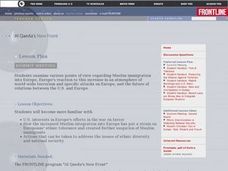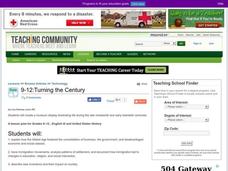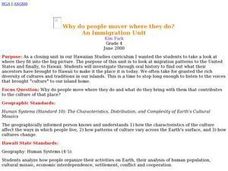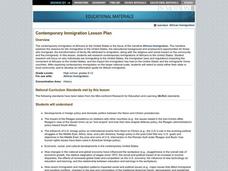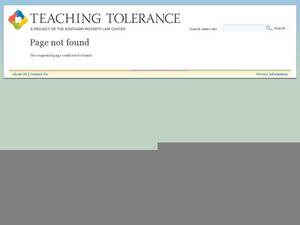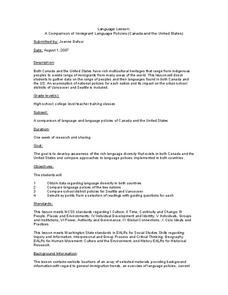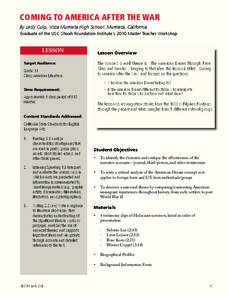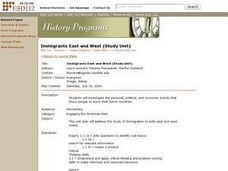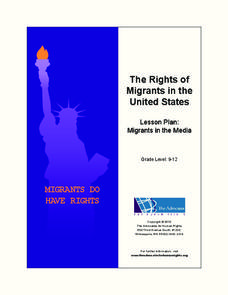Curated OER
Summit Meeting
Students examine various points of view regarding Muslim immigration into Europe. They view and discuss the PBS Frontline video, "Al Qaeda's New Front," read and discuss articles, and present information about their article in a jigsaw...
Curated OER
Where Do I Come From?
Students research immigration from Europe to the United States. In this immigration lesson, students read the book, The Long Way to a New Land. Students use a world map to locate Sweden and other countries in Europe. Students pretend...
Curated OER
Turning the Century
High schoolers examine the Gilded Age. In this Gilded Age lesson, students create a museum of their own showing what life was like in the nineteenth and early twentieth centuries. High schoolers investigate immigration, settlement and...
Curated OER
Why do people mover where they do?
Students read factual stories of migration to Hawaii, analyze and explain push and pull factors, interview parents about their cultural heritage, identify countried of origin of their ancestors, graph migration patterns on an world map,...
Curated OER
Contemporary Immigration Lesson Plan
Students research contemporary immigrations of Africans to the United States. They study their community's immigration facts, and develop an information guide for African immigrants.
Curated OER
Injustice on Our Plates: Immigrant Women
Students investigate the plight of undocumented workers. In this social justice lesson, students research undocumented workers as well as consumer boycott movements and write about their impressions.
Curated OER
Retain or Abandon, Adapt or Convert: The Immigrant's Dilemma
Students examine the problems and options facing immigrants and formulate a position paper. It is based on their reading and their familiarity with immigration issues in the United States.
Curated OER
A Comparison of Immigrant Language Policies (Canada and the United States)
Pupils explore the linguistic backgrounds that have shaped the cultural perspectives of Canada and the United States. In this cultural comparison lesson, students create a class presentation that reflects the similarities and differences...
University of Southern California
Coming to America After the War
As part of their exploration of the American dream, class members examine primary source materials to compare immigrant experiences of those arriving early in our country's history to those arriving in the US after World War II. To...
National Endowment for the Humanities
David Walker vs. John Day: Two Nineteenth-Century Free Black Men
What was the most beneficial policy for nineteenth-century African Americans: to stay in the United States and work for freedom, or to immigrate to a new place and build a society elsewhere? Your young historians will construct an...
Curated OER
What’s your Name?
Youngsters work to build empathy, cultural understanding, and a sense of self as they uncover the story behind their own names. They read the book, The Name Jar, discuss immigration and how it feels to be in a new place. Then, they...
Stanford University
Jacob Riis
Fourth graders view and discuss the photographs of Jacob Riis.In this Jacob Riis and Immigrants instructional activity, 4th graders analyze the photographs of Jacob Riis and answer questions about the feelings evoked by the photographs....
Curated OER
Chinese immigrants in British Columbia, 1870
Students create graphs and tables on the number of Chinese in British Columbia according to 1870 Census data. They analyze the data and complete worksheets in small groups and then discuss their conclusions as a class.
Curated OER
Immigrants East and West
Learners investigate the personal, political and economic events that drove people to leave their home countries. They research Chinese migrations in the 1800s and the English migrations in the 1600s. They create an identity based on...
Curated OER
German Immigrants:Their Contributions to the Upper Midwest
Students study how contemporary lifestyles/cultures/traditions are influenced by the contributions of the settlers of that region; and use their prior knowledge of German to discuss photographs of people.
Curated OER
immigration
Second graders engage in the task of looking at the how people flock to America from different parts of the world. They conduct research using a variety of resources. Students look at history as a vehicle of change and how people...
Curated OER
The Testing of the Feebleminded Immigrants
Students examine the intelligence testing of Henry Goddard during the early 1900s. They discover criticisms that are still occuring today. They analyze how science and technology is contributing to this practice.
Curated OER
Trails of Understanding: The Earliest Immigrants
Middle schoolers research Native American tribes. In this human migration lesson plan, students determine how tribes lived and established cultures. Middle schoolers create PowerPoint presentations that feature their findings.
Curated OER
Everything was up to date in 1628
Students view a video of Colonial House, a reality series where people lived according to the standards of European immigrants to the U.S. in 1628. In this colonial history lesson, students research changes in geographic areas over time...
Advocates for Human Rights
Migrants in the Media
Class members examine two documents—The Universal Declaration of Human Rights and The Rights of Migrants in the United States—and then use reports in the media to assess how well the US is doing in ensuring these rights.
PBS
Stereotypes vs. Statistics (Grades 4-8)
Stereotypes can be painful if they are used to discriminate against others. Statistics, however, can be helpful in dispelling myths propagated by stereotypes. Using a thoughtful lesson plan, scholars complete graphic organizers and...
Angel Island Immigration Station Foundation
Moving to the Poems of Angel Island
A poem carved on Angel Island's walls is the guiding text of a lesson that challenges scholars to put movement into a written piece of art. After warm up-activities, learners play a game of "Pass the Clap" and "Pass the Line," in which...
Smithsonian Institution
Borders and Community: Early 20th Century Chicago Neighborhoods and Ethnic Enclaves
Chicago is one city, four neighborhoods, and countless nationalities. The lesson explores the ethnic division of Chicago in the early twentieth century. Academics read primary sources, analyze maps, and tour an online exhibit to...
It's About Time
Factors Affecting Population Size
How do we predict future population growth? Young researchers investigate various factors affecting the size of our population. As they calculate and interpret graphs to determine factors that could potentially affect increases and...
Other popular searches
- Famous Immigrants
- Famous American Immigrants
- Hmong Immigrants
- Chinese Immigrants
- Illegal Immigrants
- German Immigrants
- Canadian Immigrants
- Jewish Immigrants
- American Immigrants
- Mexican Immigrants
- Immigrants and Math
- Famous Immigrants of Uk


